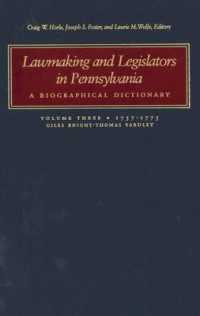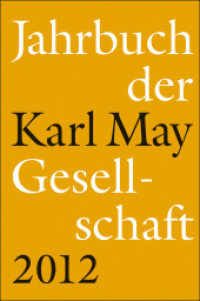- ホーム
- > 洋書
- > 英文書
- > Cinema / Film
Full Description
One of the first books to explore Russian cinema in the new millennium, this volume captures the emergence of a new cinematic sensibility and interprets it through the framework of the symbolic mode. Analysing films by established directors such as Sokurov, Zviagintsev and Zel'dovich, as well as lesser-known filmmakers like Balabanov, Fedorchenko and Kalatozishvili, Contemporary Russian Cinema explores the particular style of film presentation that has emerged in Russia since 2000, characterised by its use of highly abstract concepts and visual language. Whether directed towards a mystical world, or even towards an afterlife, the symbolic mode defines the emergence of a specific mindscape which has escaped previous representational forms, and is intrinsically linked to Russia's dramatic political and economic development since the turn of the twenty-first century.
Contents
IntroductionChapter 1: Abstracted Subjectivity and Knowledge-Worlds: Aleksandr Sokurov's Taurus (2001)Chapter 2: The Lacking Sense of Cinema: Aleksandr Proshkin's The Miracle (2009)Chapter 3: Gatekeepers of (Non-)Knowledge: Aleksei Balabanov's Morphine (2008)Chapter 4: Symbolic Folds and Flattened Discourse: Andrei Zviagintsev's Elena (2010)Chapter 5: Non-Knowledge and the Symbolic Mode: Nikolai Khomeriki's A Tale About Darkness (2009)Chapter 6: The World and the Event: Kirill Serebrennikov's St. George's Day (2008)Chapter 7: A Plea for the Dead (Self): Renata Litvinova's Goddess: How I Fell in Love (2004)Chapter 8: Body in Crisis and Posthumous Subjectivity: Igor' Voloshin's Nirvana (2008)Chapter 9: The Difficulty of Being Dead: Aleksandr Veledinskii's Alive (2006)Chapter 10: Intentionality and Modelled Subjectivities: Aleksei Fedorchenko's Silent Souls (2010)Chapter 11: Abandoned Being: Mikhail Kalatozishvili's The Wild Field (2008)Chapter 12: Conclusions: Amplifications of Subjectivity: Aleksandr Zel'dovich's The Target (2010)FilmographyBibliographyIndex








